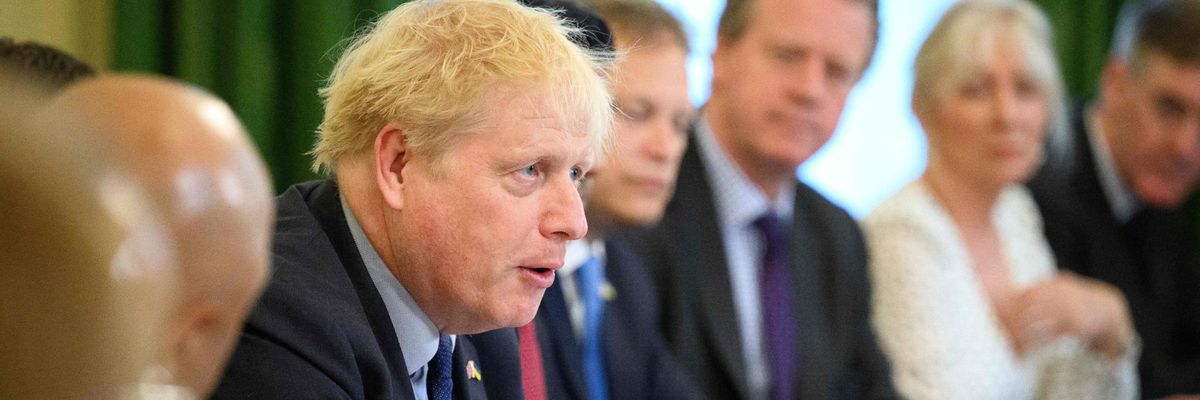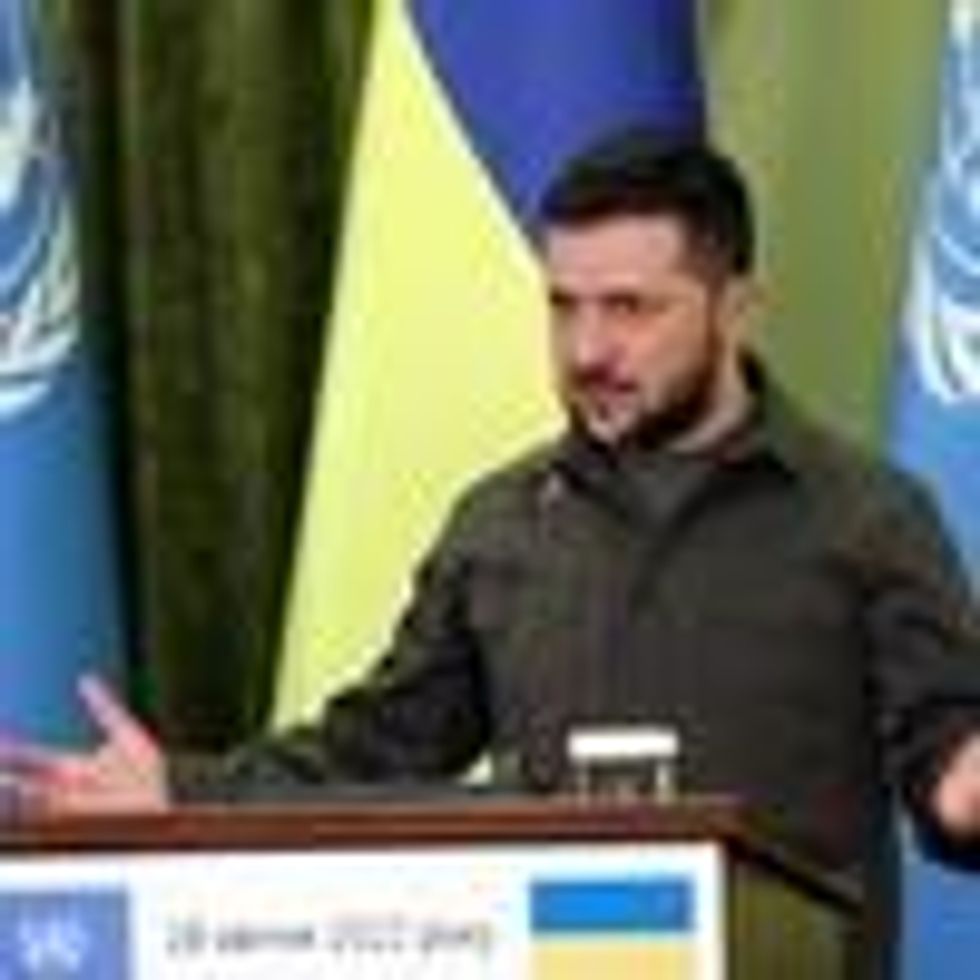
Britain's Prime Minister Boris Johnson speaks as he chairs a cabinet meeting at 10 Downing Street in London on June 7, 2022. (Photo: Leon Neal/Pool/AFP via Getty Images)
To donate by check, phone, or other method, see our More Ways to Give page.

Britain's Prime Minister Boris Johnson speaks as he chairs a cabinet meeting at 10 Downing Street in London on June 7, 2022. (Photo: Leon Neal/Pool/AFP via Getty Images)
Fresh off his narrow victory in a closely watched no-confidence vote, British Prime Minister Boris Johnson told his top cabinet ministers on Tuesday that Ukraine should not be pushed to accept a "bad peace" with Russia, remarks that align with private comments he reportedly made to Ukrainian President Volodymyr Zelenskyy in April.
"Britain and the U.S. appear to have abandoned even the limited military restraint they showed early on in the war."
"He said it was vital that President Zelenskyy was not pressured into accepting a bad peace, noting that bad peace deals do not last," Johnson told top officials, according to the prime minister's spokesperson. The official didn't say whether Johnson specified what a "bad" agreement would look like.
"He said the world must avoid any outcome where [Russian President Vladimir] Putin's unwarranted aggression appears to have paid off," the spokesperson added.
Johnson's meeting with cabinet ministers came weeks after the Ukrainian newspaper Ukrayinska Pravda reported that during a visit to Kyiv in April, the British leader urged Zelenskyy to cut off diplomatic talks with Putin, insisting that the Russian president "should be pressured, not negotiated with."
Peace talks have since been at a standstill as Russian forces ramp up their assault on eastern Ukraine and the governments of the United Kingdom and the United States prepare to arm Ukrainian forces with longer-range rocket systems, heightening fears of a broader war between Russia and NATO.
Chris Nineham, the vice chair of the U.K.-based Stop the War Coalition, warned Monday that Johnson's continued opposition to diplomatic talks with Russia will only serve to prolong the devastating war and compound its grisly humanitarian toll.
"It is first and foremost the Ukrainians who will suffer from this approach as the conflict turns into a terrible war of attrition," Nineham wrote in a blog post, accusing the U.K. and other western powers of "deliberately trying to head off moves towards serious negotiations."
On Monday, Zelenskyy said peace talks with Moscow are currently at "level zero" as Russian forces have occupied roughly 20% of Ukrainian territory. While demanding a one-on-one meeting with Putin, Zelenskyy has said he is unwilling to make territorial concessions as part of any diplomatic settlement with Russia.
"We want the Russian army to leave our land--we aren't on Russian soil," Zelenskyy said last month. "We won't help Putin save face by paying with our territory. That would be unjust."
Related Content

In his blog post on Monday, Nineham argued that the West's push for "nothing less than the complete defeat of Russia" has significantly heightened the chances that Russia's war will spread beyond Ukraine.
"The war has global implications," Nineham wrote, "and the risks of a frightening military clash between nuclear-armed great powers are higher than at any time for half a century."
"Britain and the U.S. appear to have abandoned even the limited military restraint they showed early on in the war," he added. "Their policy of pumping in the weapons and pushing for outright victory risks disaster."
Trump and Musk are on an unconstitutional rampage, aiming for virtually every corner of the federal government. These two right-wing billionaires are targeting nurses, scientists, teachers, daycare providers, judges, veterans, air traffic controllers, and nuclear safety inspectors. No one is safe. The food stamps program, Social Security, Medicare, and Medicaid are next. It’s an unprecedented disaster and a five-alarm fire, but there will be a reckoning. The people did not vote for this. The American people do not want this dystopian hellscape that hides behind claims of “efficiency.” Still, in reality, it is all a giveaway to corporate interests and the libertarian dreams of far-right oligarchs like Musk. Common Dreams is playing a vital role by reporting day and night on this orgy of corruption and greed, as well as what everyday people can do to organize and fight back. As a people-powered nonprofit news outlet, we cover issues the corporate media never will, but we can only continue with our readers’ support. |
Fresh off his narrow victory in a closely watched no-confidence vote, British Prime Minister Boris Johnson told his top cabinet ministers on Tuesday that Ukraine should not be pushed to accept a "bad peace" with Russia, remarks that align with private comments he reportedly made to Ukrainian President Volodymyr Zelenskyy in April.
"Britain and the U.S. appear to have abandoned even the limited military restraint they showed early on in the war."
"He said it was vital that President Zelenskyy was not pressured into accepting a bad peace, noting that bad peace deals do not last," Johnson told top officials, according to the prime minister's spokesperson. The official didn't say whether Johnson specified what a "bad" agreement would look like.
"He said the world must avoid any outcome where [Russian President Vladimir] Putin's unwarranted aggression appears to have paid off," the spokesperson added.
Johnson's meeting with cabinet ministers came weeks after the Ukrainian newspaper Ukrayinska Pravda reported that during a visit to Kyiv in April, the British leader urged Zelenskyy to cut off diplomatic talks with Putin, insisting that the Russian president "should be pressured, not negotiated with."
Peace talks have since been at a standstill as Russian forces ramp up their assault on eastern Ukraine and the governments of the United Kingdom and the United States prepare to arm Ukrainian forces with longer-range rocket systems, heightening fears of a broader war between Russia and NATO.
Chris Nineham, the vice chair of the U.K.-based Stop the War Coalition, warned Monday that Johnson's continued opposition to diplomatic talks with Russia will only serve to prolong the devastating war and compound its grisly humanitarian toll.
"It is first and foremost the Ukrainians who will suffer from this approach as the conflict turns into a terrible war of attrition," Nineham wrote in a blog post, accusing the U.K. and other western powers of "deliberately trying to head off moves towards serious negotiations."
On Monday, Zelenskyy said peace talks with Moscow are currently at "level zero" as Russian forces have occupied roughly 20% of Ukrainian territory. While demanding a one-on-one meeting with Putin, Zelenskyy has said he is unwilling to make territorial concessions as part of any diplomatic settlement with Russia.
"We want the Russian army to leave our land--we aren't on Russian soil," Zelenskyy said last month. "We won't help Putin save face by paying with our territory. That would be unjust."
Related Content

In his blog post on Monday, Nineham argued that the West's push for "nothing less than the complete defeat of Russia" has significantly heightened the chances that Russia's war will spread beyond Ukraine.
"The war has global implications," Nineham wrote, "and the risks of a frightening military clash between nuclear-armed great powers are higher than at any time for half a century."
"Britain and the U.S. appear to have abandoned even the limited military restraint they showed early on in the war," he added. "Their policy of pumping in the weapons and pushing for outright victory risks disaster."
Fresh off his narrow victory in a closely watched no-confidence vote, British Prime Minister Boris Johnson told his top cabinet ministers on Tuesday that Ukraine should not be pushed to accept a "bad peace" with Russia, remarks that align with private comments he reportedly made to Ukrainian President Volodymyr Zelenskyy in April.
"Britain and the U.S. appear to have abandoned even the limited military restraint they showed early on in the war."
"He said it was vital that President Zelenskyy was not pressured into accepting a bad peace, noting that bad peace deals do not last," Johnson told top officials, according to the prime minister's spokesperson. The official didn't say whether Johnson specified what a "bad" agreement would look like.
"He said the world must avoid any outcome where [Russian President Vladimir] Putin's unwarranted aggression appears to have paid off," the spokesperson added.
Johnson's meeting with cabinet ministers came weeks after the Ukrainian newspaper Ukrayinska Pravda reported that during a visit to Kyiv in April, the British leader urged Zelenskyy to cut off diplomatic talks with Putin, insisting that the Russian president "should be pressured, not negotiated with."
Peace talks have since been at a standstill as Russian forces ramp up their assault on eastern Ukraine and the governments of the United Kingdom and the United States prepare to arm Ukrainian forces with longer-range rocket systems, heightening fears of a broader war between Russia and NATO.
Chris Nineham, the vice chair of the U.K.-based Stop the War Coalition, warned Monday that Johnson's continued opposition to diplomatic talks with Russia will only serve to prolong the devastating war and compound its grisly humanitarian toll.
"It is first and foremost the Ukrainians who will suffer from this approach as the conflict turns into a terrible war of attrition," Nineham wrote in a blog post, accusing the U.K. and other western powers of "deliberately trying to head off moves towards serious negotiations."
On Monday, Zelenskyy said peace talks with Moscow are currently at "level zero" as Russian forces have occupied roughly 20% of Ukrainian territory. While demanding a one-on-one meeting with Putin, Zelenskyy has said he is unwilling to make territorial concessions as part of any diplomatic settlement with Russia.
"We want the Russian army to leave our land--we aren't on Russian soil," Zelenskyy said last month. "We won't help Putin save face by paying with our territory. That would be unjust."
Related Content

In his blog post on Monday, Nineham argued that the West's push for "nothing less than the complete defeat of Russia" has significantly heightened the chances that Russia's war will spread beyond Ukraine.
"The war has global implications," Nineham wrote, "and the risks of a frightening military clash between nuclear-armed great powers are higher than at any time for half a century."
"Britain and the U.S. appear to have abandoned even the limited military restraint they showed early on in the war," he added. "Their policy of pumping in the weapons and pushing for outright victory risks disaster."